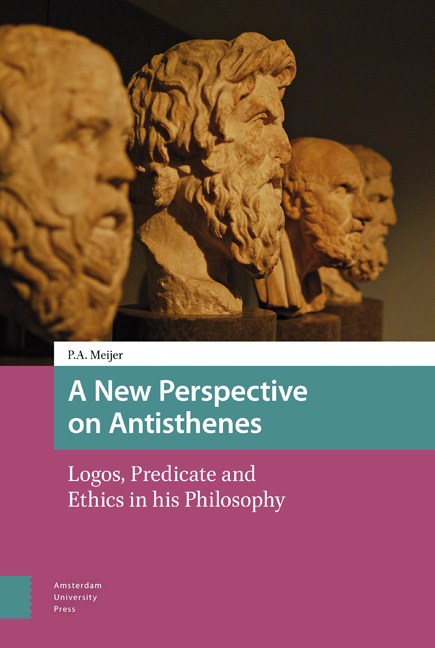Book contents
- Frontmatter
- Dedication
- Contents
- Preface
- Abbreviations
- Primary Sources – Editions Used
- Introduction
- Part I LOGOS AND PREDICATE
- Part II ANTISTHENES’ VIEWS ON THEOLOGY: HIS THEORETICAL APPROACH TO THE STUDY OF HOMER
- Part III ANTISTHENEAN ETHICS
- Epilogue: Antisthenes, an Assessment
- Appendix II The Speeches of Ajax and Odysseus
- Bibliography
- Concordance Giannantoni (SSR) – Caizzi (D.C.)
- Index
Chapter II - Sex, Marriage, Family
Published online by Cambridge University Press: 24 December 2020
- Frontmatter
- Dedication
- Contents
- Preface
- Abbreviations
- Primary Sources – Editions Used
- Introduction
- Part I LOGOS AND PREDICATE
- Part II ANTISTHENES’ VIEWS ON THEOLOGY: HIS THEORETICAL APPROACH TO THE STUDY OF HOMER
- Part III ANTISTHENEAN ETHICS
- Epilogue: Antisthenes, an Assessment
- Appendix II The Speeches of Ajax and Odysseus
- Bibliography
- Concordance Giannantoni (SSR) – Caizzi (D.C.)
- Index
Summary
Antisthenes’ teaching regarding sex and marriage
We have already encountered some of Antisthenes’ opinions on sex, which in one instance he regarded as an unnatural form of badness, but nonetheless allowed for the necessity of procreation. He dedicated an entire work to his theory of marriage, On Procreation of Children or On Marriage, a Discourse on Love, of which we do not possess direct fragments. However, we know that Antisthenes had a purely practical eugenetic point of view: he will only marry a woman who has the best natural disposition (ταῖς ϵὐϕυϵστάταις συνιόντα γυναιζί), to get the best children. Hicks, in the LCL edition of Diogenes Laertius, translates ϵὐϕυϵστάταις as ‘handsomest’ (woman), but Antisthenes recommends that a man should not look for a beautiful woman, because he will have them ‘in common’ with other men. Moreover, one has to look for a woman who will be grateful because she will treat you better – a rather unromantic point of view. The wise man will only marry for the sake of procreation, and he himself knows whom he should marry, implying that the women who were match-makers did not know.
Antisthenes was a rather extraordinary character, as we may conclude from another of his odd actions. If he saw a woman anywhere decked out with ornaments he would hasten to her house and ask her husband to bring out his horse and his arms. If the man possessed them, he would leave the woman and her ornaments alone because the man could defend himself; but if not, he would ask him to strip off his wife's finery. This was obviously a lesson: first things first. Luxury is acceptable if the basics are provided for. Elsewhere we shall see that luxury is condemnable. This makes him like the Cynics, who disapproved of luxury entirely.
Adultery
While Antisthenes dedicated a book to marriage and procreation, he was also interested in extramarital sexual relations. So he had his own view of adultery, as transmitted by the following fragment. One day when seeing an adulterer running for his life he exclaimed: ‘Unfortunate fellow, what peril you might have escaped at the cost of an obol!’ Here he implies that the aim of the adulterer was sexual satisfaction, which could have been acquired cheaply by visiting a prostitute.
- Type
- Chapter
- Information
- A New Perspective on AntisthenesLogos, Predicate and Ethics in his Philosophy, pp. 114 - 118Publisher: Amsterdam University PressPrint publication year: 2017



